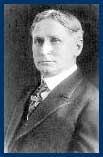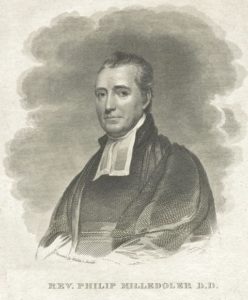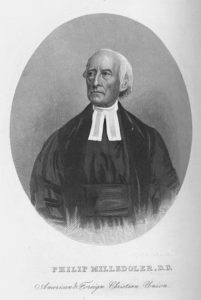Sin and Penalty are Substance and Shadow.
Some day I need to make a study of “fast day” sermons. One thesis might be that the most important of these in our national history would be those brought by Presidential request prior to and at the start of the Civil War. One such sermon was delivered on this day, September 26, 1861, by the Rev. J.B. Bittinger [1823-1885]. His sermon text was from Numbers 32:23, and he spoke before what was apparently a gathering of Presbyterian churches in Cleveland, Ohio. Our post today is heavily edited for length. To read the full text, click here: https://archive.org/details/ASPC0001905400
Numbers 32:23.—But if ye will not do so, behold ye have sinned against the Lord, and be sure your sin will find you out.
In these words of Moses, we recognize a general principle; one that is applicable now as it was then, a principle that is fundamental to all government. It may be stated in these words:
LAW IS VINDICATIVE.
God has breathed a life into every statute that He has enacted, and whenever any of these laws are broken, they will certainly avenge themselves–the mode and time of vindication may differ, but the vindication is sure to come, and when it does come, is sure to be adequate. . . Sanctions are the crown and sceptre of law, not an incident but an element of its royalty,—and to send out His statutes without their penalties, would be to uncrown them, and to degrade them from the dignity of the law, to the humiliation of advice.
We may accept it therefore as a sound inference, that penalties are an essential part of all laws, and that whenever any law is violated, the offender must and will suffer. In the natural world, there is no escape from this irrevocable decree, except by a miracle—some sovereign act of suspension or repeal. In the moral world the same is true. “The soul that sinneth, it shall die;” is the inspired utterance of the law giver Himself, and unless repealed or suspended, the dishonored law will avenge itself.
Now the one great miracle in the moral world, is the death of Christ. It is the source of every arrest of judgment, of ever reprieve, of every acquittal. This is the law in respect to individuals. Of those aggregates of individuals, called nations, it is said, “the nation and kingdom that will not serve God shall perish.” This is a particular form of the text—”and be sure your sin will find you out.” Vengeance is on the track of guilty nations, no less than on that of guilty men—but there is this important difference, the nation must be overtaken in this world. Nations as such have no existence hereafter, and therefore, if their sins find them out, it must be here. If the nation that does not serve God shall perish, it must perish here.
The text suggests another principle—OFFENDERS ARE PUNISHED IN THE LINE OF THEIR TRANSGRESSIONS. Law is not merely vindicative, but it avenges itself in kind, “and be sure your sin will find you out,”—not other sins, nor other people’s sins—but your sin. The drunkard is not punished for theft, nor the liar for gluttony; but each penalty moves on the track of its own sin. Perfidious nations are punished by perfidy, and for perfidy; covetous nations for covetousness, and by covetousness.
Summoned by the President of the United States, to observe a day of fasting, humiliation and prayer, on account of our sins as a people, we must first know what those sins are, before we can rightly confess them, bewail them, and turn from them. Our sins will help us to understand our punishment, as also our punishment will help us to discover our sins—and both, I trust will teach us to abhor and forsake them.
In enquiring, what are national sins, we should make some distinctions. There are national sins, in which many individuals of the nation have no part, and to which they give no countenance. It is also true that there are many individual sins which are not national, and which do not affect the national welfare, nor provoke national judgment. National sins are those in which the great body of the people participate, eiher by committing them, or refusing to protest against their commission. National sins are embodied in the manners, customs and laws of a people; and especially are they such sins as are committed by our rules and approved of, or tolerated by the people. In a government where the subject can vote as well as pray against sin, corrupt rulers are the real and perhaps the truest exponents of national sins. In the light of these views, let us see what are some of our national sins.
It seems to me that, our first national sins is materialism. The habit of the national mind is to give undue prominence to material as opposed to moral interests.
Our next great national sin is licentiousness. The spurning of restraint. Making light of law. Despising authority. Exalting the individual above the state. The same causes which have exposed us to the temptations of materialism, have operated unfavorably on our sentiments of respect for authority and reverence for the law. Independence, amounting to arbitrariness, is the characteristic of the American mind.
From this radical sin have come three plagues to afflict this nation. The first of these is the so-called freedom of speech and the press. The liberty to say any thing to any body. For fierceness of denunciation, for foulness of vituperation, for meanness of subserviency, and for unblushing mendacity; the campaign political party papers of this country, with few exceptions, have attained an unrivalled, and it is hoped, an unenvied “bad eminence.” So infectious is the malady that not a little of this moral unscrupulousness has trailed its slime even through some of our religious papers . . . If defamation and falsehood are sins, then we have grievously sinned through our freedom of speech and the press.
The next plague coming from our nations of independence, and must fostered by the free press spoken of, is the characteristic of our office-holders. We have for years exalted to office many of the vilest of men. We have made those our rulers whom we would be ashamed to introduce to our families. Self-seeking and unscrupulous men, flattering the people to blind them, have crept into place and power everywhere. Third-rate men intellectually, and men of no rate morally…
The third plague that has smitten us because of our materialism and arbitrary independence, is the kind of legislation we have had and have tolerated. The higher functions of government are seldom carried on on any principles higher than expediency—political expediency, or even partisan expediency . . . The morality of a statute is not its strong recommendation, for not claiming to derive our right to legislate from the divine nature and origin of government, we too generally assume the right to please our party, which is often only another name for benefitting ourselves. Our inalienable legislative rights seem to be: first, to do what we please; and second, to do what we can.
Our third great national sin is slavery. It is our greatest national sin, because it is infiltrated with materialism and licentiousness, and because it is the creature of law. It is an iniquity decreed by statute. American slavery is not merely the right of one man to another man’s services; but it is the right of one man to another man; not the right simply to work him, but to sell him. It is the right, by law, to erase the name of his Creator, and write upon him the name of his owner. This terrible forgery carries with it the slave’s wife and children, his limbs and senses, his faculties and earnings, and, if it should please God to convert him his gifts and graces. It takes him out of the category of man and puts him into the schedule of things.
But this is not all. Its power to beget sin has made it more formidable than its own iniquity. It is the snaky head of Medusa, poisoning all it touches, and petrifying all who look upon it. The materialism of our own country readily gathered about it.
But I will leave the sins to consider their visitation upon us. The text says: “be sure your sin will find you out.” The general principle asserted is that law is vindicative. This has been already considered. The special principle asserted is that the law vindicates itself in the line of its violation. This, too, has been partially unfolded, by showing what some of our national sins are. It only remains to show that we are now suffering the penalty of our sins; or, in the words of the text our sins have found us out. Sin and penalty are substance and shadow, each pointing to the other, and each helping to prove the other’s reality.
At length our sins have overtaken us. Our materialism blunted our moral sense so that we would not and could not see its benumbing touch, our fine spiritual discernment seemed gone. It defiled our newspapers, it poisoned our public charities, it infested our pulpits, and it depraved our politics. But we went to our farms, our merchandise, and our coarse pleasures. We grew rich and cared not, and only when taxes became too onerous or official misrule threatened our property, did safety committees spring from indignant communities, and execute a sort of wild justice upon official outlaws. Embezzlements, forgeries, defaultings, dishonest assignments, bankrupt laws, and city and State repudiation, are all proofs of our materialism, and in part the penalties of it. And now comes voracious war to glut itself on our gross wealth—to eat up our selfish gains, and, I trust, to deliver us from the thraldom of national covetousness. We can save our industry, our enterprise, our intelligence and our virtue. It is meant that we shall. We may learn economy, moderation, and trust in God; it is designed that we shall, but the price demanded is our money or our life.
But our sin has already found us out, and what shall we do to avert the full punishment? We must repent, and our repentance must be in line of our sins. If we have been guilty of covetousness, it will not do to confess something else; if we regard iniquity in our heart, the Lord will not hear. If we have worshipped mammon, let us repent of our covetousness. If the love of material interests has made us negligent of our liberty, and forgetful of the liberties of others, let us confess our sin, and be vigilant . . . If we have been faithless to our promises, let us henceforth begin and speak each man truth to his neighbor, and owe no man anything. Let us repent of our pride, our boasting, and our evil inventions. Let us repent of slavery and put it away from us, for “we are verily guilty concerning our brother in that, for centuries, we have seen the anguish of his soul when he besought us, and we would not hear, therefore is this distress come upon us. Let us accept the challenge. It is the crisis in our history—not commercial, nor industrial, but moral. We never had a grander opportunity, nor had any nation, to immortalize itself; to die nobly if die we must, to live nobly if live we may. Once and again this question has come before us. Will we write our name in the golden book of national glory?
One thought more and I have done. By our coming together this day; by our confessions and supplications we profess our faith in God, and the dominion of His justice. We shrink from that justice, and we have appointed a fast to avert our doom; or, if not avert, at least alleviate it. We afflict our souls, and bow down our heads, but shall we call these sorrowful words a fast? or these sings of mourning an acceptable day to the Lord?
Is not this the fast that He has chosen?
To loose the bands of wickedness;
To undo the heavy burdens;
To let the oppressed go free;
And to break every yoke?
Then shall we call, and the Lord will answer.
We shall cry, and He shall say: here I am.



